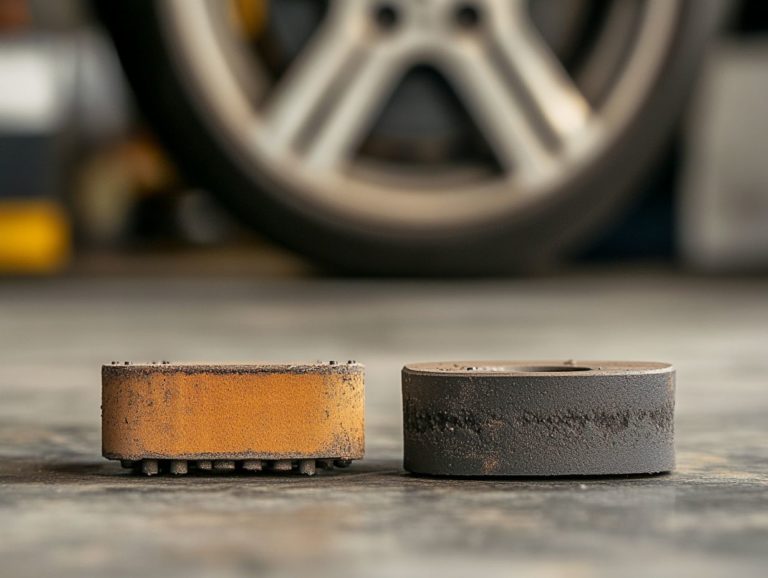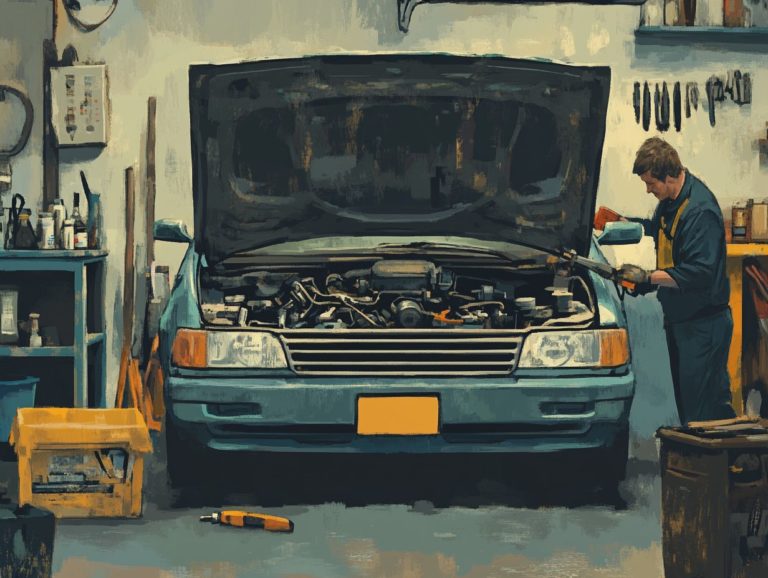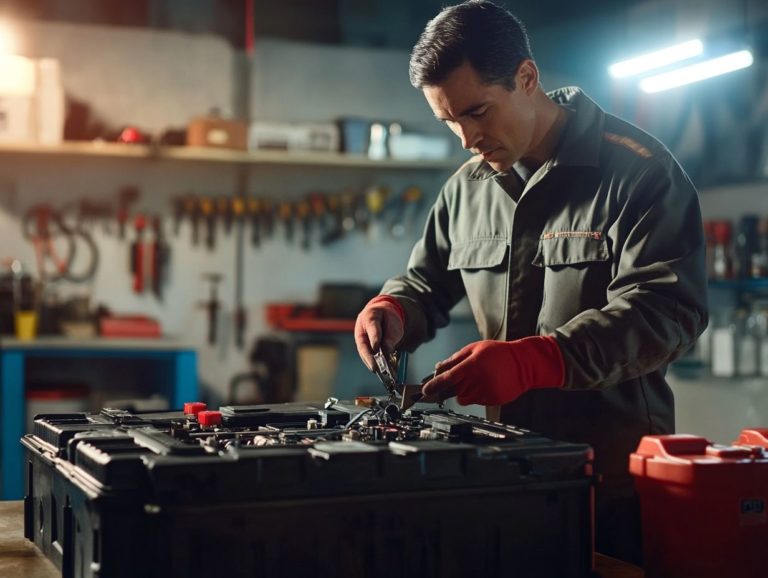What Are the Signs of a Failing Alternator?
An alternator is a vital component of your vehicle, tasked with generating electricity and ensuring your battery remains charged.
As with any mechanical part, it can experience wear and tear over time. By recognizing the early signs of a failing alternator, you can avoid unexpected breakdowns and the financial strain of costly repairs.
This guide delves into the workings of alternators, highlights common warning signs of failure, explores the causes behind these issues, and offers valuable tips for diagnosis and prevention.
Staying informed will empower you to keep your vehicle running smoothly!
Contents
- Key Takeaways:
- Understanding Alternator Function
- Common Signs of a Failing Alternator
- Potential Causes of Alternator Failure
- Diagnosing Alternator Issues
- Replacing a Failing Alternator
- Preventing Alternator Failure
- Frequently Asked Questions
- What are the signs of a failing alternator?
- How do I know if my alternator is failing or if it’s just a dead battery?
- Can I still drive my car if the alternator is failing?
- What happens if I ignore signs of a failing alternator?
- How long does an alternator typically last?
- Can I replace the alternator myself?
Key Takeaways:
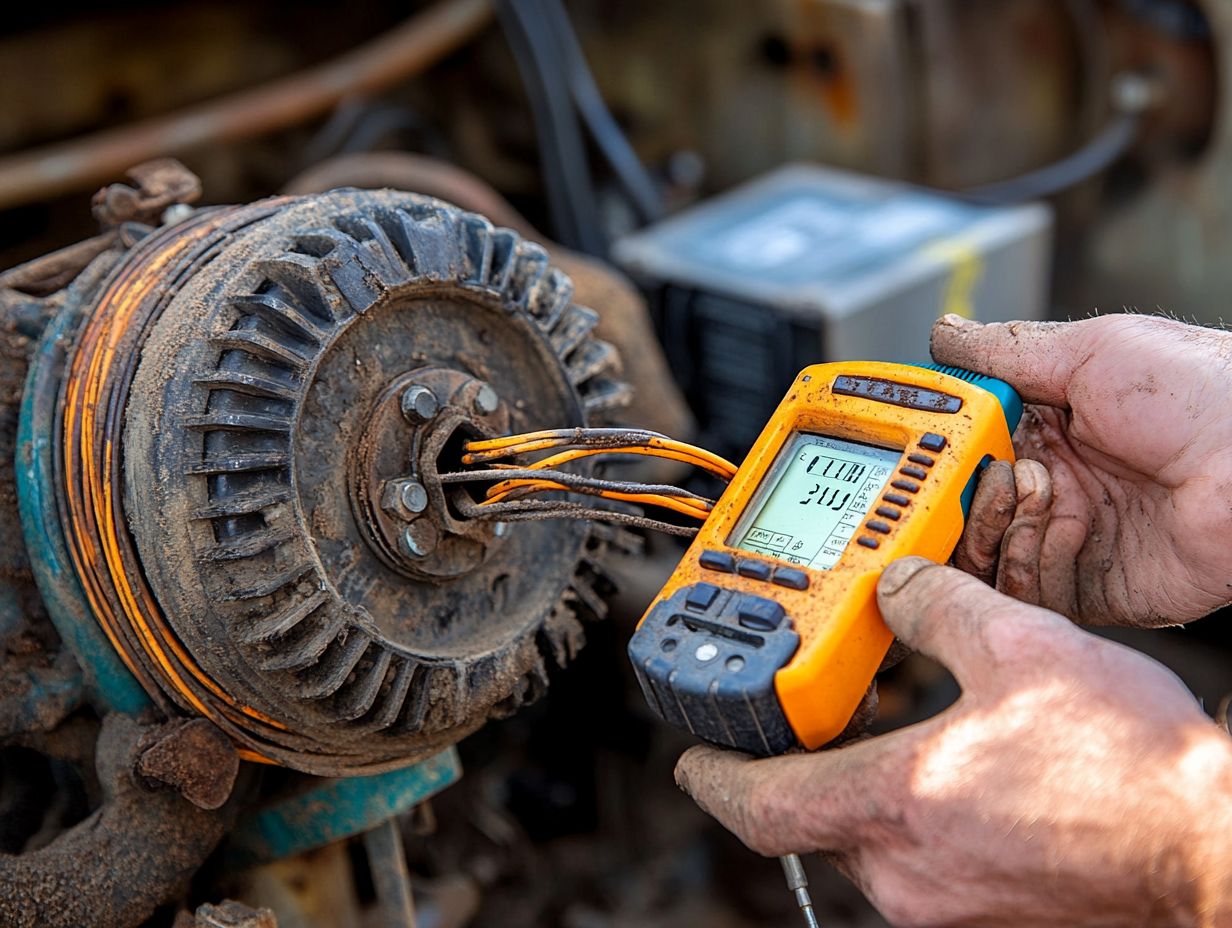
- Dimming headlights and electrical issues are common signs of a failing alternator.
- Strange noises and smells can also indicate a potential problem.
- Regular maintenance and care help prevent alternator failure.
Understanding Alternator Function
Understanding how an alternator works is essential for anyone keen on maintaining their vehicle s electrical system.
This knowledge helps you steer clear of potential engine failures.
An alternator plays a pivotal role; it transforms mechanical energy from your car’s engine into electrical energy, specifically direct current (DC) voltage. This is crucial for charging your battery and powering essential accessories like headlights, power windows, and dashboard lights.
The alternator’s performance significantly influences your automobile’s overall reliability.
By grasping its operation, you can pinpoint issues early on to prevent costly repairs.
What is an Alternator and How Does it Work?
An alternator is a crucial element in your car’s electrical system, primarily tasked with converting the mechanical energy produced by the engine into electrical energy for battery storage.
This essential process kicks into gear when the engine s rotational motion drives the alternator through a drive belt, enabling it to generate alternating current (AC). As the engine operates, the alternator’s rotor spins within the stator’s magnetic field, creating electromagnetic induction.
This induced voltage is then transformed into direct current (DC) by a diode rectifier, facilitating the battery’s recharge and supplying power to various electronic systems in your vehicle.
Ultimately, the harmonious interaction between the alternator, the engine, and the battery guarantees a dependable flow of electricity, which is vital for starting your car and powering all those handy accessories.
Common Signs of a Failing Alternator
Being able to identify the common signs of a failing clutch can spare you the hassle of being stranded with a dead battery or facing additional electrical issues in your vehicle.
Watch out for symptoms like a flickering battery warning light on your dashboard, dimming headlights, and accessories that just aren’t functioning properly these could all point to the alternator not supplying enough voltage to your electrical system.
If you start hearing unusual noises, such as grinding or whining, consider that a red flag for potential mechanical failures within the alternator. It’s wise to seek a professional inspection and necessary repairs before things escalate into a more serious predicament.
Dimming Headlights and Electrical Issues
Dimming headlights and other electrical issues are often among the first signs that your alternator might not be delivering the voltage your vehicle’s electrical system needs.
As the alternator’s efficiency starts to wane, it struggles to maintain the necessary voltage levels, leading to fluctuations in the electrical current that powers various components in your vehicle.
This inconsistency doesn’t just affect your lights; it can also compromise critical systems like ignition and fuel delivery.
When voltage regulation goes off track, you may experience diminishing performance. It’s crucial for you to address these symptoms promptly.
Ignoring these indicators could trigger a cascade of failures, ultimately impacting your vehicle’s reliability and safety.
Strange Noises and Smells
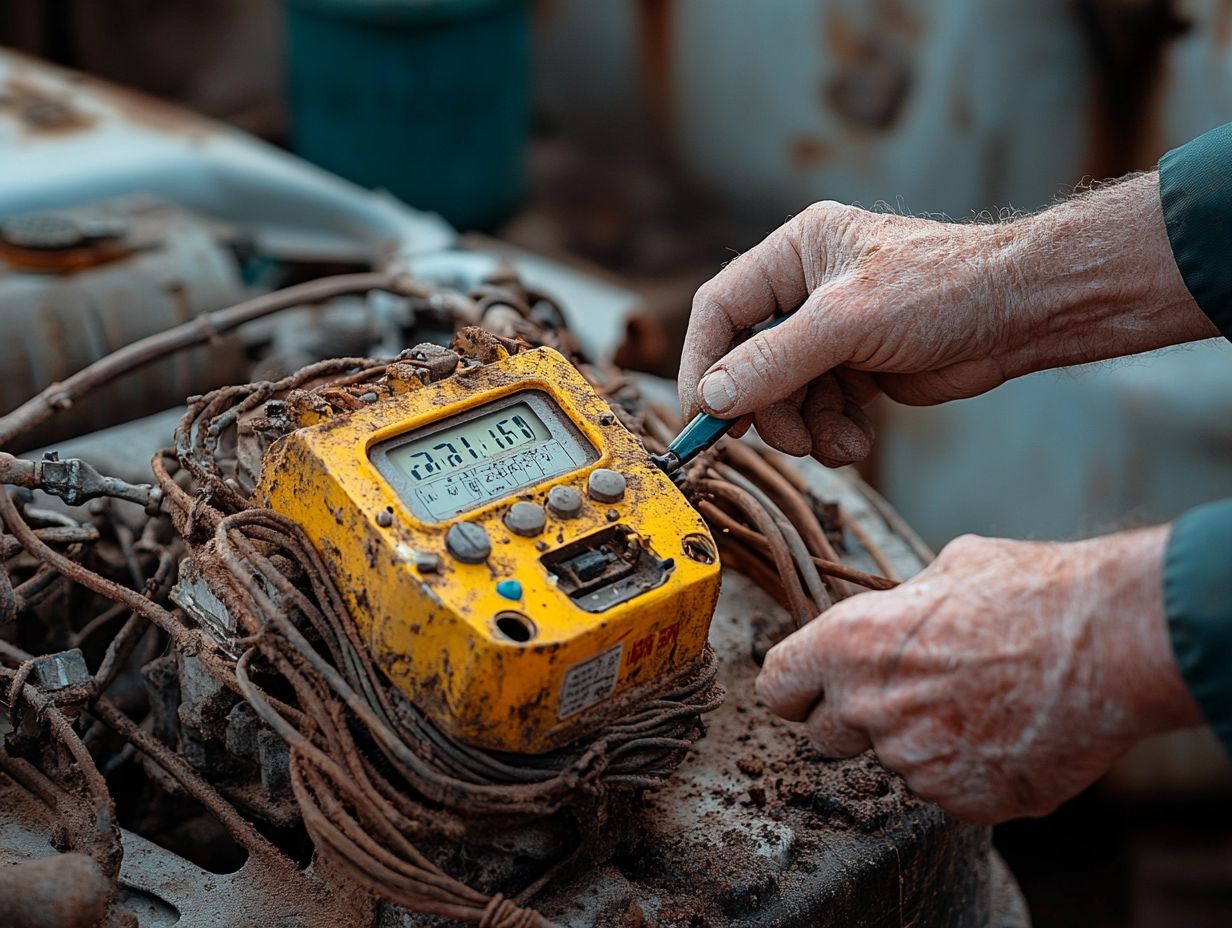
Strange noises and smells creeping from under your vehicle’s hood are not just minor annoyances; they could signal serious issues with your alternator that you should never overlook.
You might hear a persistent grinding sound, which often suggests failing bearings, or a high-pitched whine indicating that your alternator is struggling to meet your vehicle’s power demands.
If you catch a whiff of burning rubber or an electrical odor wafting into the cabin, that s your cue that something is genuinely wrong potentially involving wiring problems or overheating components.
It s crucial to address these symptoms quickly. Ignoring them can lead not just to expensive repairs but also to jeopardizing your vehicle’s safety and reliability on the road.
Potential Causes of Alternator Failure
Understanding the causes of alternator failure helps you take proactive steps, preventing issues from escalating into expensive repairs. Common culprits include the inevitable normal wear over time that affects the alternator’s internal components, like the voltage regulator which controls the electrical output of the alternator and bearings, leading to mechanical failure.
External factors like inadequate electrical connections, friction from the drive belt, and challenging environmental conditions can also intensify wear, undermining the alternator’s capacity to produce sufficient voltage for your vehicle’s electrical system.
Age and Wear and Tear
Age and normal wear over time play pivotal roles in the decline of alternator performance, with internal components gradually degrading. This deterioration can have a ripple effect on your vehicle’s entire electrical system, leading to symptoms such as dimming lights or persistent battery drain.
To avert potential mechanical failures, regular inspections are essential. As a vehicle owner, you should be vigilant for signs like unusual noises or warning lights illuminating your dashboard. These red flags often indicate wear in the bearings or other critical components.
Regularly check the alternator s connections and belts to catch issues before they escalate, ensuring that your system operates efficiently for a longer duration.
Other Factors to Consider
When you re pondering the potential causes of alternator failure, it s crucial to consider various external factors that can influence your vehicle s electrical system performance.
Poor electrical connections can create an intermittent power supply, compelling the alternator to exert more effort than necessary. Environmental conditions such as extreme temperatures, high humidity, and exposure to dust or debris can also take a toll on the alternator’s efficiency.
Friction from a worn or misaligned drive belt can also add unwelcome strain on the alternator, leading to premature wear and tear. Tackling these factors head-on can save you from costly repairs.
Diagnosing Alternator Issues
Diagnosing alternator issues demands a meticulous approach to uncover the underlying problems affecting your vehicle’s electrical system, allowing you to take the necessary steps to resolve them.
An experienced automotive technician typically starts with a thorough visual inspection, checking for loose connections, damaged components, or any signs of wear that could lead to alternator malfunction.
After this initial assessment, various diagnostic tests are performed measuring voltage output and evaluating the battery’s condition to pinpoint specific issues that require attention.
Don t wait until it s too late address these symptoms now! Stay proactive and keep your vehicle running smoothly by staying alert for these signs!
Diagnostic Tests and Techniques
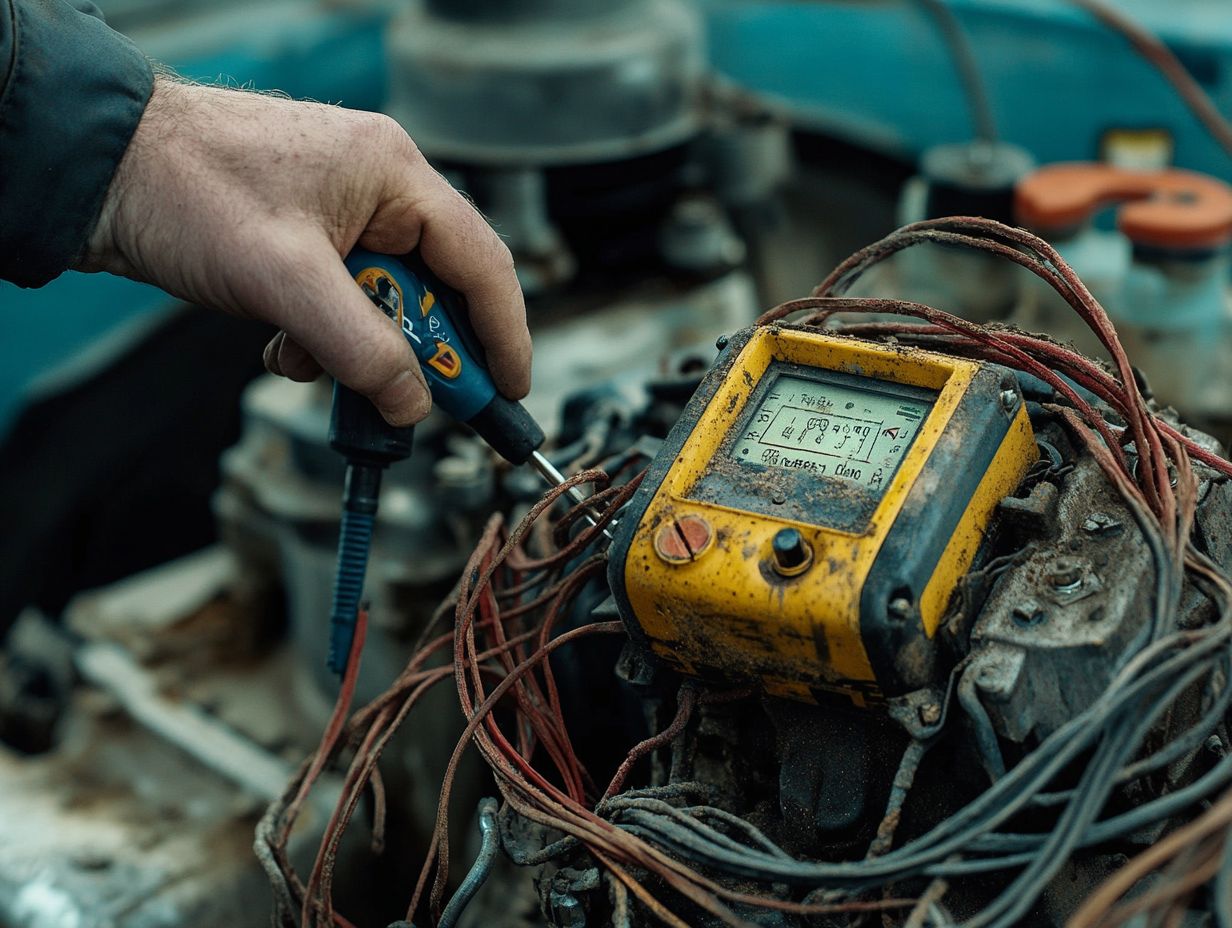
Various diagnostic tests and techniques are available to evaluate the condition of an alternator. These methods help pinpoint the root cause of its failure.
These tests voltage tests, load tests, and belt tension inspections serve as critical indicators of the alternator s overall performance and reliability. Voltage tests measure the output voltage while the engine runs, helping you spot any discrepancies that might signal a malfunction.
Load tests check if the alternator can provide enough power for your car s needs. This ensures it supplies ample energy to all components.
Belt tension inspections are equally vital. They confirm that the drive belt maintains the right tension, minimizing the risk of slipping and potential failure. Together, these assessments provide invaluable insights into the health of your electrical system. They guide your decisions on maintenance or necessary repairs.
Replacing a Failing Alternator
Don’t let a failing alternator ruin your ride! Replacing it will restore your vehicle’s electrical system to peak performance. Knowing the costs and considerations involved empowers you to make an informed decision.
The price of alternator replacement can vary widely. This variation is based on your car’s make and model, the specific type of alternator required, and the labor rates at your chosen repair shop.
While some may feel confident tackling the job themselves, others may prefer to enlist the expertise of a reputable service provider like Firestone Complete Auto Care. They are known for their professional repairs and thorough inspections.
Costs and Considerations
The costs of replacing an alternator can vary significantly. Factors such as your vehicle type and the service provider you choose for the repair influence these costs.
On average, you might find yourself spending between $300 and $1000 for the whole process. This includes parts, labor, and possibly additional diagnostic fees.
A new alternator generally falls within the range of $100 to $500, depending on your vehicle s make and model. Labor costs could add another $100 to $200 to the overall bill based on how complex the installation is.
It’s also crucial to consider warranty options. Some parts come with guarantees that can offer you peace of mind. Choosing a reputable repair service ensures quality workmanship and helps you sidestep any hidden costs from subpar repairs.
DIY vs Professional Repair
Choose wisely this decision could make or break your car s performance. When faced with a failing alternator, you often find yourself at a crossroads: should you dive into a DIY repair or seek out professional service?
Tackling the repair on your own can lead to substantial cost savings, especially if you have the skills and tools to navigate the complexities of electrical systems. There s a certain thrill in solving problems independently.
However, be mindful of the steep learning curve that comes with mastering techniques like proper wiring and checking the flow of electricity.
On the other hand, opting for professional service ensures you benefit from expertise and specialized equipment. While it may strain your budget, it could save you from complications down the road. Evaluate your comfort level with repairs and the risk of improper installation.
Preventing Alternator Failure
Don t wait until it s too late! Preventing alternator failure requires a blend of regular maintenance and proactive care strategies. This can significantly extend the lifespan of this vital component in your vehicle s electrical system.
By taking these measures, you ensure that your alternator operates efficiently. This safeguards your vehicle’s overall performance and reliability.
Maintenance and Care Tips
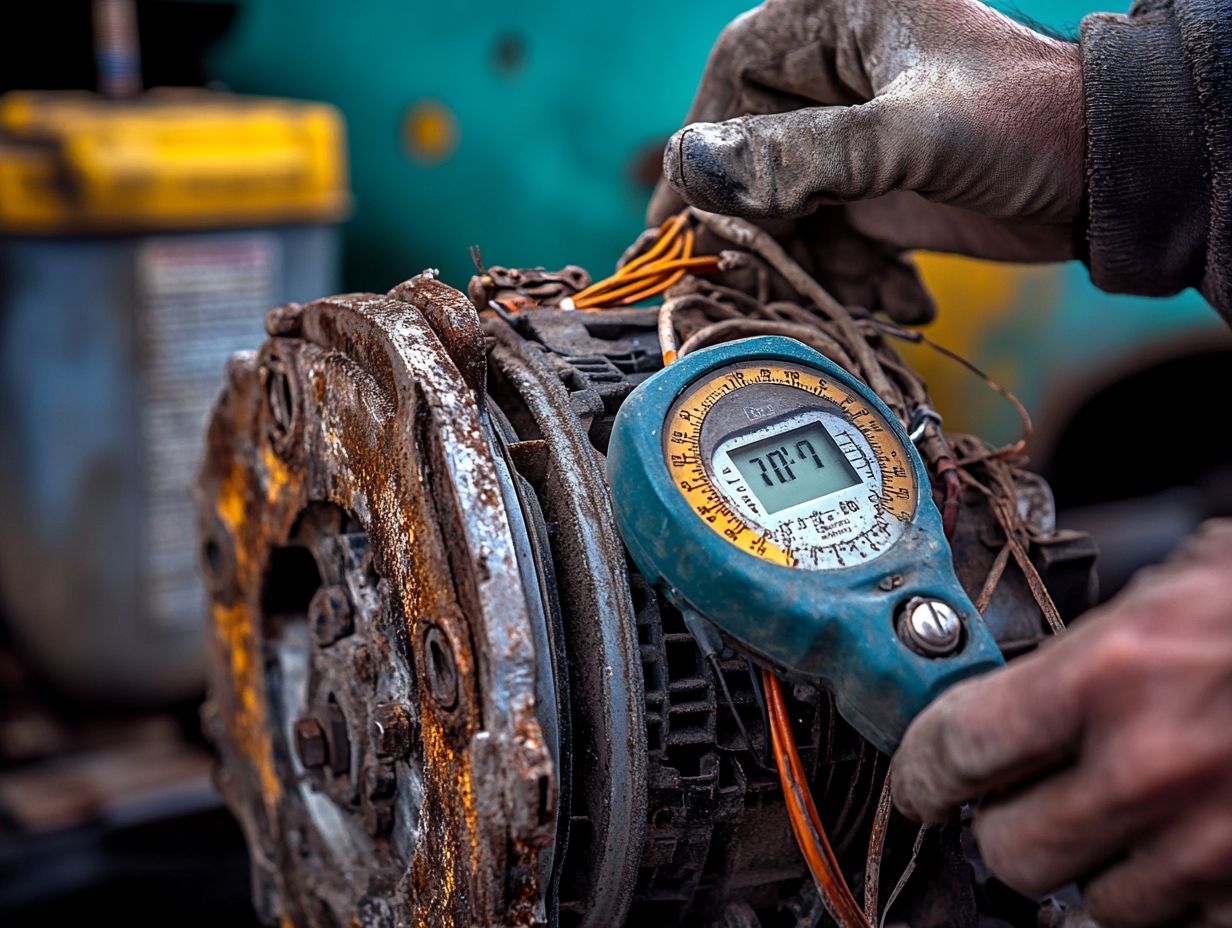
Regular maintenance and care tips for your alternator can significantly reduce the risk of unexpected failures, ensuring your electrical system operates smoothly.
Incorporating regular checks into your vehicle s maintenance schedule allows you to catch early signs of wear or damage before they escalate into costly repairs. It’s advisable to clean the connections regularly since dirt and corrosion can impede electrical flow, impacting the alternator s performance and your vehicle’s reliability.
Monitoring battery health is crucial; an underperforming battery can place undue strain on the alternator, leading to early breakdowns. By adopting these preventive practices, you not only enhance the longevity of your alternator but also ensure your entire electrical system functions efficiently, providing you with a seamless driving experience.
Frequently Asked Questions
What are the signs of a failing alternator?
The signs of a failing alternator include dimming or flickering headlights, a dead battery, difficulty starting the car, strange noises from the engine, and dashboard warning lights. It’s also important to be aware of other issues, such as signs of a failing fuel pump, which can affect your vehicle’s performance.
How do I know if my alternator is failing or if it’s just a dead battery?
If your car’s battery is relatively new and you’re experiencing dimming headlights or difficulty starting the car, it’s likely that the alternator is the problem rather than the battery.
Can I still drive my car if the alternator is failing?
It’s not recommended to continue driving your car if the alternator is failing. A complete failure could leave you stranded on the road.
What happens if I ignore signs of a failing alternator?
Ignoring signs of a failing alternator can lead to further damage to your car’s electrical system and potentially leave you stranded. Don’t delay! Fixing issues with your alternator quickly can save you from bigger headaches.
How long does an alternator typically last?
The lifespan of an alternator can vary, but it typically lasts between 80,000 and 150,000 miles. Factors like driving habits and environmental conditions can also affect its lifespan.
Can I replace the alternator myself?
Replacing an alternator can be complex and requires some technical knowledge. It’s recommended to have a professional mechanic replace the alternator to ensure it s done correctly.
Make sure to check your alternator today or schedule a professional inspection for peace of mind!


